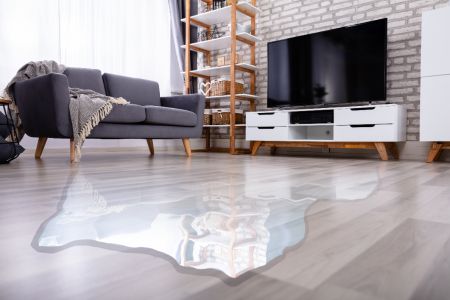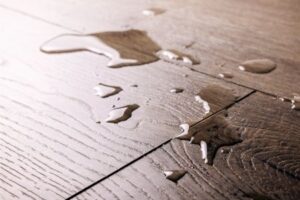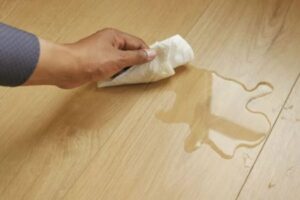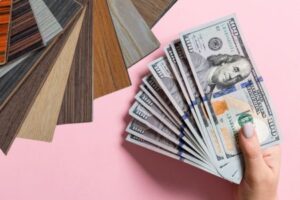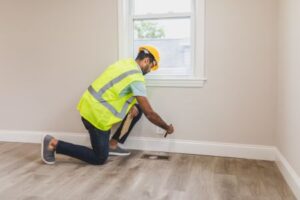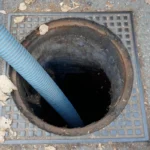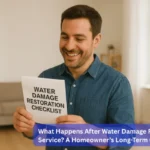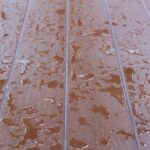When selecting flooring for areas prone to moisture, choosing materials that can withstand water exposure without deteriorating is essential. Water-resistant and waterproof flooring options are ideal for high-moisture environments like bathrooms, kitchens, and basements. These materials prevent water from seeping into the floor structure, reducing the risk of damage like warping, swelling, or mold growth.
Flooring choices that offer durability against moisture can ensure that your home remains both functional and aesthetically pleasing for years. Selecting the right flooring can also save you money on repairs and replacements. Therefore, it is important to consider the best water-resistant options available to maintain a safe and comfortable living space.
Difference Between Water-Resistant and Waterproof Materials
Water-Resistant
Water-resistant materials can withstand some moisture but are not entirely immune to water. These floors are designed to resist water penetration for a limited period or under certain conditions, such as light spills or humidity. However, prolonged exposure or large amounts of water can still damage the material over time. For example, water-resistant laminate can handle spills, but it could warp or swell if left unattended. Regular cleaning and immediate drying are essential to maintain the effectiveness of water-resistant floors.
Waterproof
Waterproof materials are entirely impervious to water, offering maximum protection against moisture and guarding against water-based damage. Waterproof flooring, like vinyl or porcelain tiles, will not warp, swell, or discolor when exposed to water. These materials are ideal for moisture-prone areas, such as bathrooms, kitchens, and basements, as they provide long-term durability and protection. Regular maintenance is still necessary, but waterproof flooring offers the highest level of defense against water damage.
Why Water-Resistant Flooring Matters in Homes
Water-resistant flooring is essential in modern homes, especially in kitchens, bathrooms, laundry rooms, and basements where moisture is common. This flooring prevents water absorption, reducing the risk of damage, mold growth, and expensive repairs. Its moisture-resistant properties protect your investment and promote a healthier environment by limiting conditions for harmful bacteria and allergens.
Additionally, water-resistant flooring provides an efficient solution for unexpected spills or leaks, causing minimal disruption. With enhanced durability, long-term performance, and a wide range of styles available, this flooring option offers both functionality and aesthetic appeal, ultimately increasing property value and ensuring lasting protection for every home.
Top Waterproof Flooring Options
When it comes to choosing the best flooring for areas susceptible to water damage, several top options stand out. These waterproof flooring options deliver superior moisture resistance and enhance your space’s style and functionality. They support water restoration efforts and offer long-lasting durability in any environment.
Vinyl Flooring
Vinyl flooring is a popular waterproof option that offers durability and versatility in design. Its moisture-resistant composition is ideal for areas prone to water spills and damp conditions. Easy to install and maintain, vinyl flooring supports efficient water restoration projects when needed, providing aesthetic appeal and resilience in high-humidity environments. This option seamlessly blends style with practicality—truly impressive.
Tile Flooring
Tile flooring is an exceptional waterproof choice designed to withstand moisture and heavy usage. Its ceramic or porcelain surfaces offer a sleek, modern look ideal for bathrooms and kitchens. Resistant to spills and stains, tile flooring ensures efficient water restoration should unexpected water damage occur. This option balances durability and style, making it an exceptionally reliable solution for very wet areas.
Engineered Hardwood Flooring
Engineered hardwood flooring combines natural wood aesthetics with enhanced waterproof capabilities. Its layered construction resists moisture better than traditional hardwood, making it suitable for areas with potential water exposure. Engineered hardwood accommodates occasional water restoration projects while maintaining elegance and durability. With careful maintenance, this flooring option offers a warm and inviting option.
Laminate Flooring
Modern laminate flooring offers effective water resistance, mainly when built with a high-density fiberboard (HDF) core and enhanced moisture-resistant treatments. Although not entirely waterproof, it withstands light moisture exposure without significant damage. Many options now feature water-repellent coatings that prevent seepage and extend durability. Combining affordability with versatile design, laminate flooring mimics other flooring types.
Rubber Flooring
Rubber flooring is a superior waterproof solution suited for both residential and commercial applications. Its inherent water resistance makes it ideal for gyms, basements, and laundry rooms, while its slip-resistant, durable surface enhances safety and comfort underfoot. Easy to clean and maintain, rubber flooring prevents water and stains from penetrating its structure. Although it may come at a higher price, its water-resistant properties are a great investment.
Waterproof Carpet
Waterproof carpets feature a specially engineered protective layer that blocks moisture from reaching the backing, making them ideal for basements and other moisture-prone areas. Constructed with resilient synthetic fibers that resist water absorption and mildew, these carpets offer enhanced durability compared to traditional options. Available in a wide range of styles and colors, they provide both comfort and practicality.
Concrete Flooring
Concrete flooring is naturally water-resistant, making it an excellent choice for moisture-prone areas, such as basements and garages. Sealing with a quality waterproof coating offers enhanced protection against water infiltration, cracks, and other damage. With regular maintenance, sealed concrete floors can remain durable for decades. This low-maintenance option suits both residential and commercial spaces.
Granite or Slate
Granite and slate are natural stone flooring options renowned for their exceptional durability and inherent resistance to water damage. Granite offers a polished, sophisticated finish, while slate brings a rustic, textured charm. Ideal for kitchens, bathrooms, and entryways with high humidity, both stones perform admirably under occasional water exposure. With proper sealing and maintenance, they maintain structural integrity and elegance for many years.
Epoxy-Coated Concrete
Epoxy-coated concrete is a robust, waterproof flooring solution ideal for basements, garages, and commercial spaces where superior moisture resistance is essential. The seamless epoxy layer creates an impermeable barrier, protecting the concrete from stains, abrasions, and chemical damage. This low-maintenance floor is easy to clean and available in a variety of finishes, offering both functional durability and aesthetic flexibility.
Comparison of Durability, Cost, and Maintenance
Choosing the right flooring involves balancing durability, cost, and maintenance to meet your lifestyle and budget. Vinyl flooring is highly durable, affordable, and low-maintenance, with a robust design that withstands daily wear and moisture, making it perfect for water-prone areas. Though initially more expensive, tile flooring offers exceptional strength and moisture resistance; its long-lasting quality and ease of cleaning make it a wise investment for high-traffic spaces.
Engineered hardwood provides natural elegance and improved moisture resistance, offering a durable and attractive option despite requiring careful cleaning and occasional refinishing. Each flooring type minimizes long-term repair costs and supports efficient water restoration. Whether you choose vinyl, tile, or engineered hardwood, you enjoy enhanced performance, cost savings, and lasting style that protect your home while delivering functionality and aesthetic appeal. These flooring options provide reliable protection against water damage, ensuring your investment remains practical and appealing over many years.
Tips for Preventing Water Damage to Flooring
Taking proactive steps is essential for preserving the beauty, durability, and value of your flooring. Following a few simple guidelines can significantly reduce the risk of water damage and minimize expensive repairs or water restoration services. Consider these practical tips:
- Regular Inspections: Check for leaks around appliances, sinks, plumbing fixtures, water heaters, and other common water intrusion areas.
- Use Protective Mats: Place mats or rugs in high-traffic areas, entryways, and near water sources to catch spills and prevent moisture penetration.
- Ensure Proper Drainage: Clear gutters, downspouts, and outdoor drainage systems so water flows away from your foundation.
- Install Sump Pumps: Sump pumps help reduce water buildup during heavy rainfall in basements or low-lying areas in and around homes.
- Monitor Humidity Levels: Use dehumidifiers and ensure proper ventilation to maintain balanced indoor humidity and reduce moisture buildup.
- Prompt Clean-Up: Clean up spills immediately and adhere to manufacturer maintenance and cleaning routines guidelines.
Implementing these strategies not only prevents water damage but also extends the life of your flooring. Staying vigilant with regular upkeep and water restoration readiness can protect your home’s investment and maintain a safe, attractive living environment.
Final Thoughts
Selecting the right flooring can significantly improve your home’s resistance to water damage. Options like luxury vinyl, tile, and concrete offer durability and water resistance, enhancing your home’s value while reducing costly repairs. Prioritizing water-resistant materials protects your living space and streamlines any necessary water restoration. Make an informed decision to safeguard your home against moisture-related issues and maintain a beautiful, resilient environment. Looking for expert advice on water-resistant flooring? Contact SS Water Restoration for professional guidance on preventing water damage to your floors!

